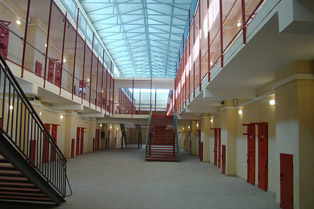Molly Corso, Eurasianet.org
Freedom has a flip side. In Georgia, that translates into a prison population that is proportionally larger than Russia’s, and a justice system that remains a sensitive subject for the government.
With an overall population of roughly 4.5 million people, Georgia may be a democratization leader among formerly Soviet states, but it also has one of the highest incarceration rates in the world -- 531 prisoners per every 100,000 people. Tbilisi still has a long way to go, though, before it catches up to the global leader -- the United States, which has a rate of 731 prisoners per 100,000 inhabitants, according to the London-based International Centre for Prison Studies.
President Mikheil Saakashvili’s administration has strived in recent years to put some distance between Georgia and the country’s Soviet legacy of arbitrary justice. Reforms have attempted to improve the judicial system and better regulate its prisons. Nevertheless, complaints about systemic abuses continue to be aired. And despite the Georgian government’s avowed commitment to transparency, obtaining information about prison populations and conditions poses challenges: officials strictly limit access.
Graphic images of apparent bruises and open sores on the body of 39-year-old Zurab Delianidze, who died on May 1 while serving a six-year prison sentence for marijuana possession, have emerged as the latest touchstone of controversy concerning alleged abuses in Georgia’s prisons. The photographs, disseminated online, depict a painfully skinny man, disfigured by marks and sores on his back, sides, and torso.
The Delianidze incident is one of a series of recent controversies that also includes a case in which a 46-year-old man allegedly fell to his death in a police station and allegations of prison guards raping an inmate.
Representatives of both the Ministry of Corrections and Legal Assistance, which runs the country’s prison system and the Ministry of Internal Affairs have repeatedly denied claims concerning the mistreatment of prisoners in Georgian prisons and police stations. In Delianidze’s case, investigators have attributed his death to an unspecified “venereal disease,” which caused bed sores and other marks on his body.
Natia Imnadze, the head of the Georgian Ombudsman Office’s Prevention and Monitoring Department is skeptical of the official explanation and argues that the Delianidze case is a reflection of a systemic problem in Georgia’s prisons, one that includes inadequate medical care for prisoners. Problems of “ill treatment” have persisted, she said, despite the Georgian government’s extensive efforts to reform prisons.
The US State Department’s 2012 Report on Human Rights concurred with that opinion. The report, released on May 24, identifies the “[a]buse of prisoners and detainees by government officials, as well as dangerously substandard prison conditions,” as one of the most “important” human rights abuses documented in Georgia last year.
The Ministry of Corrections declined to talk with EurasiaNet.org about conditions in Georgia’s prisons, referring this reporter instead to the ministry’s website.
Construction of new prisons tops the official list of reforms the ministry says help safeguard prisoners’ rights. The London-based prison watchdog Penal Reform International reports that 14 of Georgia’s 17 prisons are new or refurbished. The Ministry of Corrections’ website says that 90 percent of the country’s prisoners are in such facilities. The website also lists alternative sentencing, library access and vocational training, improved food services, video-conferencing and extended visits with guests as among other efforts to enhance prisoner welfare.
But prison reform activists contend that the measures do not go far enough. Overcrowding and a sense of impunity among prison officials encourage abuses, said Penal Reform International’s South Caucasus director Tsira Chanturia, who has monitored Georgia’s prison system since 2003. “They are just allowed to have their own ways to manage prisons. … So, when they don’t have so many staff, they revert to other methods of running the prisons by violence, being too harsh on prisoners and so on,” Chanturia said, referring to prison officials.
The 2011 Ombudsman’s report classified nine of Georgia’s prisons as overcrowded. Prison #1 in Tbilisi, for instance, was built to accommodate 750 detainees, but now holds 1,053.
Aside from violence, arbitrary punishments such as withholding water and hindering access to medical treatment are also used to manage prisoners, asserted Nazi Janezashvili, the executive director of Article 42 of the Constitution, a human rights organization.
Officials are also facing criticism about their general approach toward the incarceration of wrongdoers. For example, A January 2012 report from Human Rights Watch (HRW), the international human-rights watchdog, said that administrative detention -- the practice of incarcerating people for misdemeanors -- deprives Georgians of due process.
While the government claims that such criticism is prompting changes in the way Georgian detainees serve their sentences, HRW Caucasus researcher Giorgi Gogia, now part of a consultative group to reform Georgia’s Code of Administrative Offenses, countered that nothing has been done to improve the process of detaining people on vague and, at times, arbitrary charges.
Under current provisions, police need not file charges for 12 hours after an arrest, and no central database exists for attorneys to determine where a client is held, Gogia said. Court cases are perfunctory, lasting just a few minutes. Transcripts are available only after three days; appeals, though, have to take place within 48 hours. The Ministry of Justice has not publicized its proposed revisions to these practices, and did not respond to an interview request in time for publication.
Original text




